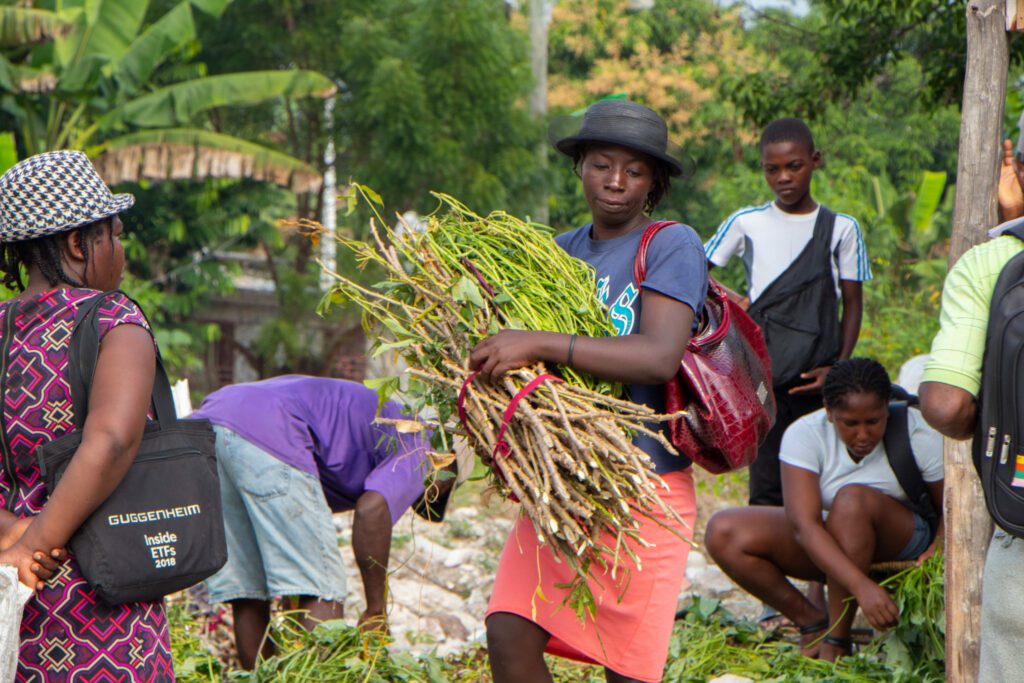By the Institut de Technologie et d’Animation, Haiti


When a magnitude 7.2 earthquake struck Haiti in August 2021, Development and Peace ― Caritas Canada launched an appeal for donations, to which Canadians responded generously. This, along with grants from the Roncalli International Foundation and Quebec’s Ministry of International Relations and the Francophonie, allowed us to support not only the provision of lifesaving emergency aid, but also longer-term recovery efforts. This article about one such effort, an agricultural program run by the Institut de Technologie et d’Animation, is reproduced with permission from their website.
The Institut de Technologie et d’Animation (ITECA) has given an important place in its intervention strategy to women’s struggles and aspirations. Adopting a work approach that is in consistent with the promotion of gender equality in farmers’ associations, ITECA is convinced that involving women in social and solidarity-based economic activities is fundamental to their empowerment.
Supporting women’s economic autonomy was seen as an important aspect of territorial rehabilitation. Indeed, the more women are accompanied and understand the mechanisms of their marginalisation, the more they can appreciate the social and economic benefits of their activities; change their relationships with their land; and feel confident about the future.
Rose-Marie Lajuste, Marie-Rose Brutus, Marie Miliette Massé and the PARECOM program represent a fascinating case in point. Lajuste, Brutus and Massé are among the most vulnerable women in their locality of Maniche, the commune1 where they have lived since early childhood. This commune in the South Department was classified as one of those most affected by Hurricane Matthew and, more recently, the earthquake of August 14, 2021.
Agriculture, considered the main source of income in this commune, has been relatively devastated. It was through agricultural production that households barely managed to subsist. As heads of their respective households, Lajuste, Brutus and Massé, too, struggled through their harvests to educate their children as heads of household. In addition to their agricultural properties, their homes were damaged.
In 2022, the Recovery Support Programme (PARECOM) implemented in the communes of Maniche, Aquin, Cavaillon and Saint-Louis du Sud supported three agricultural cycles: a spring cycle (in February), and an intermediate cycle starting in July-August, and a winter cycle starting in November.
Lajuste, Brutus and Massé were supported through the intermediate cycle. They were part of a subset of 224 women who were supported out of a total of 525 farmers whose harvests had been compromised due to seasonal fluctuations. In addition to agricultural tools and technical support, these producers received rice, bean and vegetable seeds to compensate for their agricultural losses.
The three women have done well with their harvests and are much better able to meet their families’ daily needs. At the start of the winter season, Lajuste said, “I can say that my living conditions have improved. Thanks to the seeds I received and the gardens I cultivated, I do not need to use my money to buy rice. Instead, I have enough for family to eat and I can even sell some to earn money and meet some of my family’s needs.”
Out of a total of 1,225 households that have been supported through the spring and winter agricultural seasons, 40 per cent are [headed by] women. In terms of indirect beneficiaries, approximately 15,000 people (farming families, suppliers, farmers’ associations, local authorities, etc.) have enjoyed positive spin-offs.
ITECA has relied mainly on the support of the following partners to deliver this positive and promising outcome from the first year of the PARECOM program: Agence Française de Développement (AFD), Broederlijk Delen, CCFD-Terre Solidaire, Development and Peace/MRIF2/Roncalli Foundation, FOKAL, Manos Unidas and the Mennonite Central Committee (MCC).
With the conviction that peasant agriculture remains a pillar of real socio-economic change in the country and that the economic empowerment of women is one of the major challenges, ITECA renews its firm commitment to stand with peasant communities, especially women peasants, in 2023.
1. Communes are the Haitian equivalents of municipalities. Haiti’s 10 departments are divided into 42 arrondissements, which are divided into 144 communes and then into 571 communal sections.
2. Refers to Quebec’s ministère des Relations internationales et de la Francophonie

